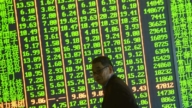【新唐人2012年6月21日訊】在墨西哥18號舉行的二十國集團領導人第七次峰會上,中國承諾,向「國際貨幣基金組織」(IMF)出資430億美元,不過專家指出,在中國百姓還承受高度通貨膨脹,貧窮人口過億的情況下,沒有必要承諾拿出其他金磚國家4倍多的投資。
這次各國向「國際貨幣基金組織」增資共4560億美元。中國承諾金額僅次於日本和德國,排名第三,佔新興經濟體出資總額(900億美元)的近50%。而和中國同屬於「金磚五國」的印度、俄羅斯、巴西分別承諾注資100億美元,南非20億美元。
雖然央行官員表示,中國參與增資將相應增加在「國際貨幣基金組織」IMF的「話語權」。不過國內民眾和媒體依然質疑,在中國的貧困人口上億,貧富兩極分化嚴重,通貨膨脹嚴重的情況下,承諾增資這麼多是否合理。
美國「南卡羅來納大學艾肯商學院」教授謝田表示,中國作為G20的成員,向國際貨幣基金組織增資,幫助應對當前世界經濟面臨的風險和挑戰是應該的, 但沒有必要承諾拿出其他金磚國家4倍多的投資,因為中國能拿出的這部分外匯儲備,實際上是有代價的。
謝田:「因為這些錢,作為外匯佔款的一部分,實際上導致了中國巨大的通貨膨脹。就是說,在中國老百姓還在承受高度的通貨膨脹的時候,中國政府卻拿出這麼多錢,來援助其他國家,而那些國家實際上,比中國人民生活的要富裕幸福的多,這實際上是蠻不公平的。」
中國科學院2012年完成的《2012中國可持續發展戰略報告》提出,按中國政府2011年底制定的收入「一天一美元」的最新貧困線,年收入在人民幣2300元 (大約354美元) 以下的貧困人口大約有1.28億,就是大約平均每11名中國人中,有1名貧困者。
但是謝田認為,這個數字並不準確。
謝田:「中國實際上幾億人在低於這個貧困線。中國科學院所謂的一美元貧困線以下的這個1.28億,我覺得根本不止於此。巴西、俄羅斯、南非,這些國家的人均收入、人均農產值和GDP都遠遠高於中國,它們其實才更有力量拿出這些錢來。」
根據《美國之音》統計,中國僅六月已經宣佈今年將無償援助阿富汗1億5000萬元人民幣;向上海合作組織其他成員國再貸款100億美元;上個月則表示,將援助柬埔寨1.2億元人民幣,以及宣佈向業門提供1億元人民幣無償援助。
謝田指出,中共從70年代就資助扶植包括朝鮮在內的專制獨裁國家,不是為了樂善好施,而是為了拉攏夥伴,在聯合國取得更多影響,抗衡民主國家。
謝田:「看看最近中共這些年在聯合國安理會的投票,你就知道它實際上一直是站在那種獨裁、專制、落後和愚昧的國家,站在一起,實際上總是跟自由社會,正的力量是相對抗的。」
中國央行剛剛在6月7號令人意外的宣佈了三年來首次降息,顯示出中國的經濟放緩速度超過預期。法國《世界報》引述專家的分析指稱,中國經濟增速放緩已經成為全球投資主要擔憂的問題之一。
這次IMF增資,美國第一次沒有參與,美國受到中共媒體的譏諷,不過「人民網」也承認,2009年IMF增資時,中共承諾認購500億美元的IMF票據,截至目前僅購買了約57億美元。這次中共仍將以購買IMF票據的形式,參與IMF增資,因此,430億也只是個承諾的額度,中共能真正做到嗎?
採訪/劉惠 編輯/尚燕 後製/肖顏
Communist China Commits to IMF Pledge, Expert Worries about Inflation
In the 2012 Group of 20 Leaders Summit in Los Cabos, Mexico,
China pledges US$43 billion to the International Monetary Fund.
Expert comments that while the Chinese are suffering from high
inflation and over one hundred million of them are living in poverty,
China should not have promised more than 4 times the funds
agreed by other BRIC countries.
Nations from around the world pledge a total of
US$456 billion to the International Monetary Fund (IMF).
China’s pledge ranks third,
second only to Japan and Germany.
It accounts for nearly 50% of the total contribution
(US$90 billion) pledged by emerging markets,
while four other large emerging markets (BRICS countries)
such as India, Russia, and Brazil commit US$ 10 billion each, and South Africa US$2 billion.
The Chinese central bank official indicates China’s participation
in increasing the funds will gain greater voting power in the IMF.
However, it is also questionable whether this promise
is reasonable considering that
over one hundred million Chinese are suffering from poverty,
serious inequality, and high inflation through China.
Professor Xie Tian from University of South Carolina Aiken’s
School of Business comments that as a member of the G20,
China should contribute to IMF emergency funds to help
address the risks and challenges facing the world economy.
However, there is no need for China to commit more than
4 times the contribution from any of the BRICS countries.
It comes with a price, because a great deal by using that
much of foreign exchange reserves.
Xie Tian: “As part of the Foreign Exchange Reserves, in fact,
this amount could lead to huge inflation in China.
Particularly when the Chinese are still suffering
from a high degree of inflation,
the government is assisting other relatively richer countries
with such huge amounts is not fair to the people."
According to the “China Sustainable Development Report 2012″
by the Chinese Academy of Sciences,
with the latest poverty line defined at the end of 2011,
“one US dollar a day" or an annual income of less than 2300 yuan,
there are about 128 million Chinese living in poverty.
That means one in every 11 Chinese is poor.
Xie Tian does not believe the accuracy of the data.
Xie Tian: “There are in fact several hundred million people
below the poverty line.
I don』t believe the number 128 million Chinese in poverty
claimed by the Chinese Academy of Sciences.
Countries such as Brazil, Russia, and South Africa have much
higher per capita income, per capita agricultural output and GDP.
They are in fact more capable of contributing that money."
According to Voice of America reports, in June China has
pledged “selfless help" to Afghanistan with 150 million yuan,
and a sum of US$10 billion in loans to the other member
states of Shanghai Cooperation Organization.
Last month, China also announced to offer assistance of
120 million yuan to Cambodia, and provide Yemen with 100 million yuan in free aid.
Xie Tian pointed out that the Communist regime has started
the financial aid since the 1970s to foster dictatorial countries including the North Korea.
It has never been about charity, but to gain influence in
the United Nations by pulling in partners to contend with democratic countries.
Xie Tian: “Look at the votes the Communist China has done
in these years in the UN Security Council.
You』ll know the regime has always been for the countries of
dictatorship, tyranny, backwardness and ignorance.
They stand together, in fact, to confront the free and
righteous society."
China’s central bank has just announced an interest rate cut
on 7th June for the first time in three years.
It shows that the Chinese economy is going down
more than expected.
The French newspaper, Le Monde, reported that
according to expert’s analysis,
the slowdown of the Chinese economy has become
one of the main concerns of global investment.
For the very first time, the United States did not participate
in the IMF pledge and thus was criticized by the Communist state media.
However, the People.com also admitted that the Communist
regime committed US$50 billion to the IMF fund in 2009, but only contributed about US$5.7 billion.
This time the Communist regime continues to participate
in the IMF in the form of raising the emergency pledge,
the amount of 43 billion is again a number. The question is
will the Chinese Communists really commit to that.



























